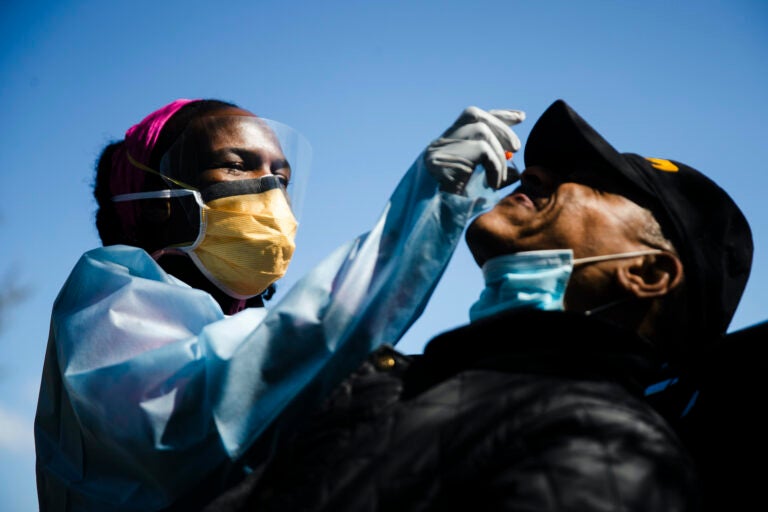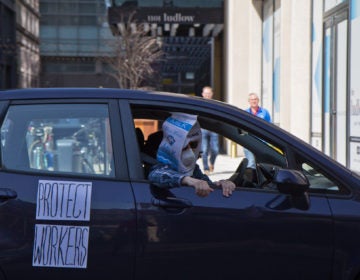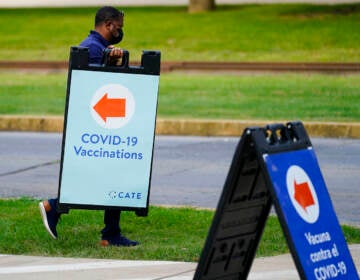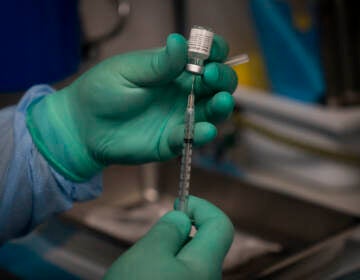Coronavirus update: Relief coming for Pa. gig workers and freelancers
Pennsylvania’s unemployment system for gig workers and those who are self-employed is expected to be fully operational by the end of this week.

Dr. Ala Stanford administers a COVID-19 swab test on Wade Jeffries in the parking lot of Pinn Memorial Baptist Church in Philadelphia, Wednesday, April 22, 2020. (AP Photo/Matt Rourke)
Updated at 5:35 p.m.
—
Are you on the front lines of the coronavirus? Help us report on the pandemic.
To date, the Pennsylvania Department of Health has reported 52,816 COVID-19 cases (including confirmed and probable cases). There are 128,269 cases in New Jersey and 5,288 cases in Delaware. Philadelphia has 16,040 cases.
Pennsylvania’s death toll stands at 2,761, New Jersey’s is at 7,910, and Delaware’s is at 182. Philadelphia’s death toll is 726.
Note: Pa. no longer includes probable COVID-19 deaths in its official count, only deaths that have been confirmed through testing.
Relief for gig workers and freelancers
Pennsylvania’s unemployment system for gig workers and those who are self-employed is expected to be fully operational by the end of this week, according to the state’s department of Labor and Industry.
The Pandemic Unemployment Assistance system is designed to serve those who have been unable to apply for traditional unemployment benefits, but have lost work due to COVID-19. Over 150,000 Pennsylvanians have applied since the portal was launched April 18, and the state has faced mounting criticism for the delay in processing claims.
“If you are eligible and approved you will receive backdated unemployment payments,” said Pennsylvania Department of Labor & Industry Secretary Jerry Oleksiak on a call Monday. “We are doing what we can.”
Department officials say they’ve brought back 70 retirees and hired 250 new intake interviewers to help speed up an application process that has left many frustrated. They say there is no longer a backlog for general claims processing.
About 1.7 million Pennsylvanians have applied for traditional unemployment assistance since March. About 70 percent of them have begun to receive benefits, officials said.
Those who are offered work and who do not have “good cause” to turn it down will no longer be eligible for benefits, but officials stressed that eligibility would be determined case-by-case.
“If part of the reason that they are not going back is they have a compromised immune system, we would look at that as a more of a relevant reason [than if] they are just making more money on unemployment,” said Susan Dickinson, director of the Office of Unemployment Compensation Benefits Policy.
Dept. of State grapples with polling place shortages, overwhelmed counties
Pennsylvania’s Department of State says it’s trying to deal with a long list of potentially disruptive issues ahead of the June 2 primaries — among them, a shortage of poll workers and polling places, county election offices unable to keep up with an influx of mail-in ballots, and the prospect of crowded polling places where coronavirus might spread.
DOS Secretary Kathy Boockvar said her department has taken a few concrete steps to try and mitigate those and other issues.
They’ve embarked on what she calls a “comprehensive” education campaign, which includes mailing registered voters postcards in English and Spanish urging them to take advantage of the state’s newly-available absentee voting option, which does not require voters to give a reason for not voting in person.
Boockvar said so far, the state has received more than 960,000 applications for remote voting.
Asked why the state hasn’t simply moved to a mail-only election, Boockvar said she’s worried that there wouldn’t be enough time to appropriately spread word of the change, and that getting rid of all in-person voting might disenfranchise people.
There would also be legal issues — technically, Pennsylvania’s current election code requires availability of in-person voting, and the commonwealth’s GOP-controlled legislature has resisted the idea of getting rid of it.
They’ve also so far been unmoved by counties’ requests that they be allowed to begin counting mail-in ballots before 7 a.m. on Election Day — though Boockvar noted she’s still hoping Republican leaders reconsider.
Ultimately, she and Governor Tom Wolf said they’re hoping Pennsylvania can pull off a sort of hybrid election, wherein most people vote absentee, county election offices take a little longer to process all the votes, and they’re able to find enough polling locations and poll workers to safety allow in-person operations as well.
“This whole thing, if it’s going to work, it’s going to work if Pennsylvanians recognize they don’t want to infect their fellow Pennsylvanians,” Wolf said. “That’s if they go to the store, they go back to work, they’re with their family, and it’s certainly true if they go to a crowded polling place.”
Along with their awareness campaign, the Wolf administration is sending kits with personal protective equipment to counties, and is also disbursing $13 million in federal grant money across the commonwealth, so election offices can increase staffing, buy equipment, and generally try to make June 2 safer.
Philly “starting to look better,” health commissioner says
Philadelphia reported no new deaths caused by COVID-19 on Monday and just 186 new cases.
City officials say it’s a hopeful trend.
“We’ve been through some tough times in this epidemic, but over the weekend the situation here in Philadelphia is starting to look better,” said Philadelphia Health Commissioner Dr. Tom Farley.
Hospital numbers are largely holding steady, Farley added, indicating that the worst of the surge may be over.
As testing capacity expands, Philadelphia has also loosened some of its criteria for getting a coronavirus test. The city is now recommending that anyone exhibiting systems get tested — not just those over 50.
On a less optimistic note, officials say they’re worried about an anecdotal rise in people congregating outdoors while not wearing masks. As the weather improves, Mayor Jim Kenney said, officials are seeing the kind of congregant behavior that could lead to a viral surge.
“Young people, for some reason or another, refuse to put this mask on,” Kenney said, noting that he saw many unmasked people while on a weekend bike ride.
Farley said that in South Korea, widespread use of masks has been a key tool in that country’s return to relative normalcy.
“We know that if we go back to the way we lived before — without wearing masks — the virus will absolutely come right back,” said Farley.
Since the pandemic began, Philadelphia has recorded 16,040 cases of COVID and 726 deaths.
Pennsylvania may release facility-specific data detailing cases at nursing homes
Pennsylvania has now eclipsed 50,000 positive cases of COVID-19 since the start of the pandemic. More than 2,700 residents have died from the virus.
The grim benchmark comes as the state prepares to move 24 of its 67 counties from “red” to “yellow” under its color-coded reopening plan, scheduled to start May 8.
They are: Braford, Cameron, Centre, Clarion, Clearfield, Clinton, Crawford, Elk, Eerie, Forest, Jefferson, Lawrence, Lycoming, McKean, Mercer, Montour, Northumberland, Potter, Snyder, Sullivan, Tioga, Union, Venango and Warren.
Asked Thursday when the next batch of counties will be reopened, Secretary of Health Dr. Rachel Levine told reporters there is “no specific timeline.” She said the state does not plan to separate the number of positive cases among residents of long-term care facilities from cases in the rest of the community in determining which counties will reopen next, as officials in Delaware County are requesting.
Nearly 20 percent of Pennsylvania’s coronavirus cases are tied to nursing homes and personal care facilities. Roughly two-thirds of the state’s death doll is connected to those institutions.
“We are not going to separate nursing home cases from other cases,” said Levine. “We are all interconnected.”
To date, the state has not released facility-specific data detailing positive cases and deaths, due to privacy concerns. Levine said her department is now considering whether to publicly release that information.
Correction: This story has been updated to reflect that Pennsylvania will not separately consider the number of positive cases in long-term care facilities when deciding which counties to reopen.
New Pa. case numbers drop slightly
Pennsylvania reported 825 new confirmed cases of COVID-19 on Monday, slightly fewer than the state reported one week ago (885). Throughout the pandemic, positive case tallies have tended to be lowest on Mondays due to testing lags over the weekend.
Another 14 Pennsylvanians have died from the virus, state officials announced.
The latest data comes as Pennsylvania prepares to roll back stay-at-home orders in 24 counties — mostly in the western and northern regions of the state.
“As we prepare to move a number of counties from red to yellow, we need all Pennsylvanians to continue to follow the social distancing and mitigation efforts in place,” Secretary of Health Dr. Rachel Levine said in a statement.
Evans calls for ‘mandatory testing’ in Black community
Appearing on WHYY’s Radio Times, U.S. Congressman Dwight Evans (D-PA) said Monday that the nation’s focus should be on “mandatory testing” for the new coronavirus, “particularly in the African-American community.”
Disproportionately large numbers of African-Americans in Philadelphia have died from COVID-19, according to city data.
Evans also called on Senate Majority Leader Mitch McConnell to halt the federal judicial nomination process and redirect that attention toward testing.
“It’s a question of priorities,” said Evans. “Where do you invest the dollars that you have?”
Evans did not say how much money such a switch would generate for testing.
McConnell has indicated that he will prioritize judicial appointments when the Senate reconvenes.
Montco “on the cusp” of case drop
Montgomery County logged 185 new confirmed coronavirus cases over the weekend, bringing the county’s total to 4,570 since the outbreak began.
Dr. Valerie Arkoosh, Chair of the Montgomery County Board of Commissioners, said the county was “on the cusp” of a meaningful drop in new cases.
“But we need to keep at it,” she added. “We cannot let up. This is not yet the time.”
So far, 314 county residents have died from COVID-19 — with another 156 classified as “probable deaths.”
Starting Monday, county officials began breaking out the number of new cases originating in prisons and long-term care facilities.
Neighboring Delaware County has asked the state government to consider COVID-19 cases in long-term care facilities separately when determining whether a region is ready to reopen.
Arkoosh said she had not reviewed that proposal and that Montgomery County had not yet made a similar request.
“I do think it’s possible we may see differing rates of infection and decline when comparing individuals in the community to individuals who live in a congregant setting,” Arkoosh said. “It may be quite appropriate to look at those rates separately and perhaps assess those rates differently.”
Delco asks state to count nursing home cases separately when weighing reopen plan
Delaware County councilmembers want Pennsylvania officials to separate out COVID-19 cases originating in nursing homes when deciding whether an area is ready to reopen.
State criteria require Delaware County to log fewer than 20 new coronavirus cases per day for a two-week stretch in order to roll back restrictions. Right now, the county is recording about 139 cases per day.
But the county council says the state should break the problem into two distinct areas: cases in the general public and cases in nursing homes.
Combining the data, the council argued in a recent statement, muddies the overall picture.
Council “views our current situation as two separate challenges that require separate approaches — infections in our nursing homes and other congregate care facilities, and the outbreak level in the broader community at-large,” the statement read.
About 70% of deaths and 20% of cases have come from nursing home residents, the council said.
Last week, the Bucks County commissioners sent a letter to Gov. Tom Wolf, arguing that the state’s bar for reopening was too high and would lead to community backlash in the Southeastern portion of the state. It also argued that it would be difficult for counties to get below the state-established threshold as the total number of tests increases.
“In our efforts to increase access to testing in the community and long-term care facilities, we will see an uptick in cases, possibly in those who are mildly symptomatic, asymptomatic, or untested who were sick in the recent past but continue to test positive,” the letter read. “That could easily drive up the numbers well beyond the threshold without actually increasing community risk, and permanently keep Bucks County in the ‘red zone.’”
Wolf Appeal by WHYY News on Scribd
WHYY is your source for fact-based, in-depth journalism and information. As a nonprofit organization, we rely on financial support from readers like you. Please give today.




![CoronavirusPandemic_1024x512[1]](https://whyy.org/wp-content/uploads/2020/03/CoronavirusPandemic_1024x5121-300x150.jpg)




